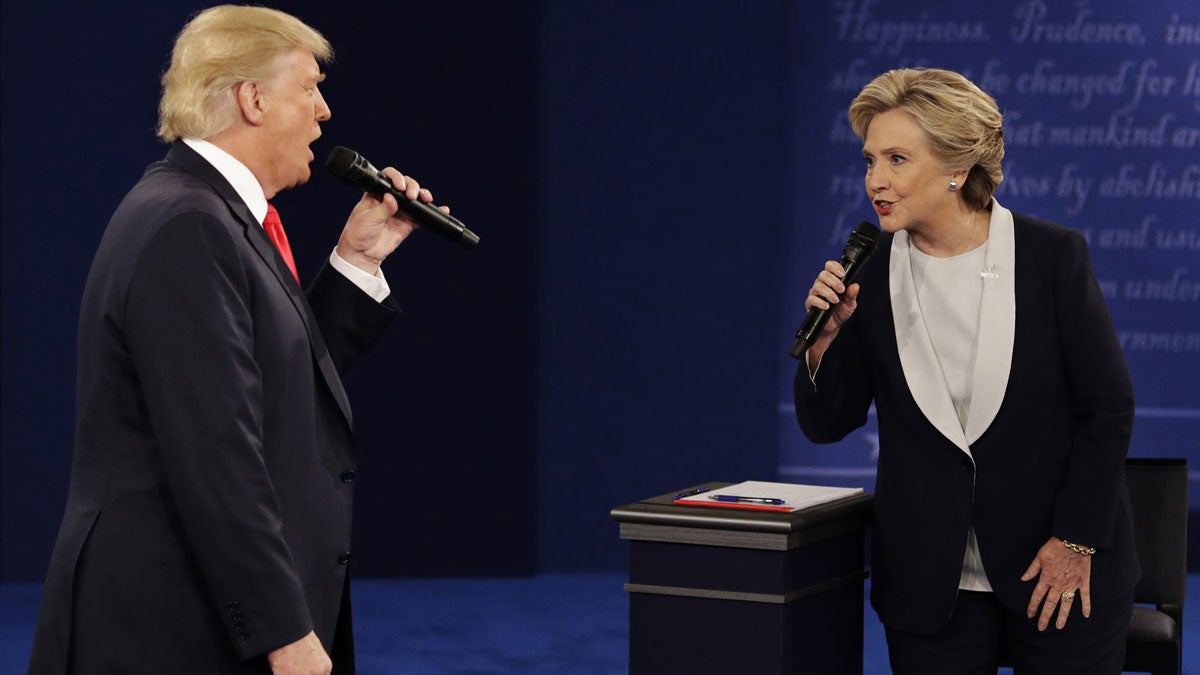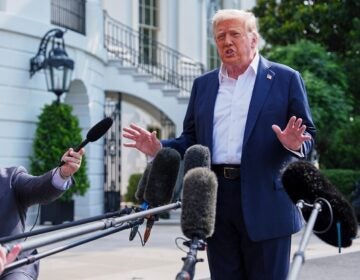Remember 2016? When beating Trump in the debates didn’t matter?
He went 0 for 3 against Clinton, but won anyway. So much for the importance of debates. Perhaps 2016 was an outlier.

Republican presidential nominee Donald Trump and Democratic presidential nominee Hillary Clinton speak during the second presidential debate last year at Washington University in St. Louis. Your political beliefs may be influencing your perception. (AP file photo)
Twenty Democratic presidential candidates are slated to debate again this week, and, as usual, each aspirant will seek to persuade voters that he or she has the smarts and moxie to go toe to toe on stage with Donald Trump. But it would be a mistake to assume that the best debater would be the best candidate, or that beating Trump in autumn 2020 debates would bode well for the balloting in November.
Just take a look at what happened in 2016.
The consensus was that Hillary Clinton thrashed Trump in three out of three debates. One disgusted Republican strategist told the conservative Washington Examiner that “barring something extraterrestrial, this race is over,” and that, referring to Trump, “the goose has cooked himself.” The Wall Street Journal editorial page pronounced Trump dead and buried: “The (election) result will be one that he has earned.”
And yet, by a cumulative margin of 77,000 voters in Pennsylvania, Michigan, and Wisconsin, Trump won the election anyway. Either they didn’t pay attention to how badly he was humiliated during the debates, or they didn’t care, or they didn’t bother to watch.
It didn’t matter that Clinton exposed him as a deadbeat with a history of ripping off working people: “Donald, I’ve met dishwashers, painters, architects, glass installers, marble installers, drapery installers, like my dad was, who you refused to pay when they finished the work that you asked them to do.” And it didn’t matter that Trump’s response was lame and incoherent: “Look, it’s all words, it’s all sound bites … first of all they did get paid a lot but taken advantage of the laws of the nation.”
It didn’t matter that Clinton skewered him for not paying his fair share of taxes: “The only years that anybody’s ever seen were a couple of years when he had to turn (his tax returns) over to state authorities when he was trying to get a casino license, and they showed he didn’t pay any federal income tax.” And it didn’t matter that, in response, Trump congratulated himself for shifting the tax burden to the average citizen: “That makes me smart.”
It didn’t matter that Clinton nailed Trump for indulging Russia’s invasion of our electoral process: “I know Donald is very praiseworthy of Vladimir Putin. But Putin is playing a very tough, long game here. And one of the things he’s done is to let loose cyber attackers to hack into government files, to hack into personal files, hack into the Democratic National Committee. And we recently have learned that this is one of their preferred methods of trying to wreak havoc and collect information…That’s why I was so shocked when Donald publicly invited Putin to hack into Americans.” And it didn’t matter that, in response, he gave Putin a pass: “She’s saying Russia, Russia, Russia…but it could also be lots of other people, it also could be someone sitting on their bed that weighs 400 pounds, OK?”
It didn’t matter that Clinton peppered him with the serial allegations of sexual assault, and it didn’t matter that, in response, he attacked the women who’d made the allegations: “They get their 10 minutes of fame, it was lies and it was fiction.” Nor did it matter that Clinton caught him in a blatant lie. When she recalled that “he held a number of big rallies where he said he could not possibly have done those things to those women because they were not attractive enough for them to be assaulted,” he quickly replied: “I did not say that!” (Yes he did. At the rallies, he had ridiculed one of his female accusers: “That wouldn’t be my first choice.” He ridiculed another accuser: “Look at her, I don’t think so.”)
It didn’t matter that, after one of his debate losses, he indulged his instinctive paranoia: “They gave me a defective mic. Did you notice that? The mic was defective on purpose. The mic was defective within the room. No, no, I wonder — was that on purpose? Was that on purpose?”
And it didn’t matter that Trump behaved like a banana-republic despot, threatening to imprison his political opponent. Addressing Clinton, he said: “If I win, I am going to instruct my attorney general to get a special prosecutor to look into your situation.” And when she said it was “awfully good” that someone with Trump’s temperament was not in charge of law enforcement, he replied: “Because you’d be in jail.” Nope, it didn’t matter that he was telegraphing his authoritarian, anti-American instincts.
He went 0 for 3 against Clinton, but won anyway. So much for the importance of debates.
Perhaps 2016 was an outlier. Perhaps the perfect storm happened because Clinton was widely deemed to be unacceptable; perhaps the autumn ’20 debates will be more productively pivotal because, this time, Trump will have a track record to defend (such as it is), and perhaps more Americans will be open to the new Democratic candidate. But there is no guarantee. We live in an era of customized disinformation, and a massive share of the potential debate audience — in thrall to an amoral charlatan — is impervious to fact-based argument.
And as the ’20 Democratic candidates vie over who would be the best debater, I’ll offer one more thought: Why do we assume that Trump will even agree to debate?
That possible scenario is not getting enough attention. There’s no law that says he must debate. It’s just a norm, and he shatters norms as he breathes. Plus, there’s precedent: Scandal-marred Richard Nixon refused to debate in autumn ’72, and voters were so outraged that they re-elected him in a landslide.
So don’t be surprised if Trump, faced with the prospect of sharing the stage with an effective Democratic debater, decides instead to string us along — the same way he hinted, during the ’16 debates, that he might not accept the results of a November defeat: “I’ll keep you in suspense, OK?”
We’re nowhere near the finale of this dystopian reality show.
WHYY is your source for fact-based, in-depth journalism and information. As a nonprofit organization, we rely on financial support from readers like you. Please give today.




